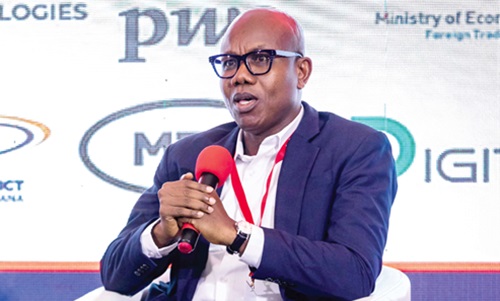The Chief Information Officer at Prudential Bank, Leopold Armah, has called on technology engineers in Africa to initiate steps towards domesticating Artificial Intelligence (AI) technology.
They can do this by gradually developing local use cases, taking into consideration linguistics and peculiar practices.
He stated that AI, evidently, had moved from experimental to essential, and permeating every area of life, including threat intelligence and cybersecurity in general, hence domesticating the tool would facilitate better appreciation of its potential.
Commenting on the topic “AI, Automation and the Future of Threat Intelligence" on the sidelines of the recently held CISO Summit 2025 in Accra, Mr Armah said it was time to simplify, invest and urgently start building capacity at both the individual and corporate levels to make AI relevant to our environment.
“Evidently, AI has moved from experimental to essential.
AI and automation are helping us to develop the ability to correlate tactics, techniques and procedures (TTPs) that enable quicker identification of threat actors and simulate attack scenarios.
It is critical, therefore, for developing countries to initiate steps toward domesticating the tool.
This will facilitate better appreciation and project the potential of the tool,” he said.
Benefits of AI
Mr Armah said some key benefits of AI and automation in threat intelligence included speed, where AI and automation could respond to threats much faster than manual intervention, thereby reducing the window of opportunity for attackers.
Another benefit he mentioned was efficiency, where automated systems could handle repetitive tasks such as patch management, log analysis and vulnerability scanning without fatigue.
He said consistency was another benefit, because speed and efficiency ensured that responses followed a consistent process, reducing human error.
He, however, gave a note of caution saying “while speed, efficiency and consistency are desirable, it's important to understand that AI and automation are not always perfect and can be prone to errors, especially when the data is not trained based on the expected outputs.
As we dive headfirst into this uncharted territory, we need to keep our eyes wide open.
It is not just about the potential benefits and drawbacks, but also about how AI is going to continue to mould and reshape the workplace in ways we might not even imagine.”
Focus
Mr Armah advised all to “look beyond the excitement and sometimes the anxieties and rather focus on becoming more conversant with the governing rules, ethical issues and the associated legal framework with data and AI.
And where there is little or non-existent, we must initiate steps towards their development.”
He said there was the need to, at all times, balance safety and morality against speed and innovation, saying machines could do a great deal, but what they should do is the statement users need to continue addressing.
AI not threat
He dispelled fears that AI and automation were serious threat to job security at the workplace referencing a quote made by Ray Kurzweil, a notable futurist, as an assurance that human beings will always remain superior to machines.
He believes AI will ultimately become our thought partner, not a replacement.
“Ray Kurzweil, a notable futurist, says ‘our technology, our machines are part of our humanity.
We create them to extend ourselves and that is what is unique about human beings.’ What readily comes to mind in response to the threat of job sentiment is the second part of Kurzweil’s statement, I believe the world will just get better if we nurture and collaborate with machines and technology to solve problems,” he said.

